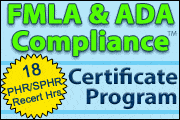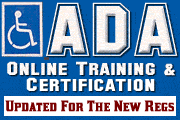The Americans with Disabilities Act (ADA) prohibits discrimination and harassment against qualified employees and applicants with disabilities, plus requires "reasonable accommodations" under certain circumstances.
Employers covered by the ADA have to make sure those individuals with disabilities have an equal opportunity to apply for jobs and to work in jobs for which they are qualified. As such, employers must provide an equal opportunity for individuals with disabilities to be promoted once they are working.
Employers also must provide equal access to benefits and privileges of employment that are offered to other employees, such as employer-provided health insurance or training, and ensure that individuals with disabilities are not harassed because of their disability.
Employers, however, are not required to create new jobs for individuals with disabilities, although nothing in the regulations would prohibit an employer from so doing.
Employers should be aware - and utilize - laws and strategies to limit use and abuse, but need to do so correctly or risk legal fines and headaches. For instance, do you know:
Get the best ADA training - in English, not legalese - that includes coverage for ADA Reasonable Accommodation, ADA Intermittent Leave, ADA Return To Work, and other ADA training topics for managers and staff.
We offer both online ADA training and in-person or virtual ADA training classes. You also have the ability to become ADA certified!
To find ADA compliance training and ADA certification courses, either select a recommended course or click on "ADA" from the 'Professional Development' section of the search box below. Also, please note that some of our ADA training courses provide ADA certification, while other cover specific topics to assist with your ADA compliance requirements.
ADA Compliance Requirements
Covered Employers: Which Employers Are Responsible For ADA Compliance?The ADA applies to:
- All private-sector employers, local, state, and federal government agencies with 15 or more employees
- Employment agencies
- Labor unions
Employers who provide public services or public accommodations have additional responsibilities to their customers under the ADA.
Eligible Employees All employees and applicants with disabilities are entitled to ADA protections.
An individual with a disability is a person who:
- Has a physical or mental impairment that substantially limits one or more major life activities
- Has a record of such an impairment
- Is regarded as having such an impairment
A qualified employee or applicant with a disability is an individual who, with or without reasonable accommodation, can perform the essential functions of the job in question.
The determination of whether a person is a "qualified individual with a disability" requires an individualized, case-by-case assessment of:
- The specific abilities of the person
- The specific requirements of the position that the person holds or desires
- The manner in which the person may be able or enabled to meet those requirements
The issue is whether the individual is qualified for the particular position, not whether the individual is qualified for a class of positions.
The analysis of whether an individual has a disability is made on a case-by-case basis; there is no "one size fits all" definition of disability. Often, this determination is made by medical experts. Additionally, a person has a disability only if the limitations the person experiences are from the impairment.
For specifics on our ADA Compliance Training & Certification program, go to
HRTrainingCenter.com/ADA-Training-Certification-Program/online-trainingADA Training For Handling Reasonable Accommodation RequestsUnder the ADA, employers are required to provide "reasonable accommodations" to qualified employees with disabilities, unless doing so would pose an undue hardship.
Aa ADA reasonable accommodation is assistance or changes to a position or workplace that will enable an employee to do his or her job despite having a disability.
Essentially, employers covered by the ADA have to make sure those individuals with disabilities have an equal opportunity to apply for jobs and to work in jobs for which they are qualified. Employers must provide an equal opportunity for individuals with disabilities to be promoted once they are working.
ADA Reasonable Accommodations may include any of the following:
- Making existing facilities accessible

- Job restructuring
- Part-time or modified work schedules
- Acquiring or modifying equipment
- Changing tests, training materials, or policies
- Providing qualified readers or interpreters
- Reassignment to a vacant position
The employer is not required to:
- Create a position for a qualified individual with a disability
- Offer the "best" accommodation available
- Lower performance standards or waive disciplinary policies
- Eliminate or transfer essential job functions
In some instances, before addressing the merits of the accommodation request, the employer needs to determine if the individual's medical condition meets the ADA definition of "disability", which is a prerequisite for the individual to be entitled to a reasonable accommodation.
Medical Examinations And The ADA A "medical examination" is a procedure or test that seeks information about an individual's physical or mental impairments or health.
Examples of medical examinations include:
- Blood pressure screening
- Vision test conducted or analyzed by an ophthalmologist or optometrist
- Range-of-motion tests
- Pulmonary functions tests
- Psychological test designed to identify a mental disorder or impairment
- Diagnostic procedures such as X-rays
- Cholesterol screening
The following factors are helpful in determining whether a procedure or test is medical:
- Is it administered by a health care professional or someone trained by a health care professional?
- Are the results interpreted by a health care professional or someone trained by a health care professional?
- Is it designed to reveal impairments to physical or mental health?
- Is the employer trying to determine the applicant's physical or mental health or impairments?
- Is it invasive (for example, does it require the drawing of blood, urine or breath)?
- Does it measure an applicant's performance of a task, or does it measure the applicant's physiological responses to performing the task?
- Is it normally given in a medical setting (for example, a health care professional's office)?
- Is medical equipment used?
Examples of tests that are not considered medical examinations:
- Tests for current use of illegal drugs (even though such tests require laboratory analysis of urine, blood, and/or hair samples)
- Physical agility tests (i.e. simulated job actions such as lifting from floor level)
- Psychological tests that measure personality traits (i.e., honesty, work habits, etc.)
- Polygraph examinations
If the existence of a disability arises, the employer still has the duty to reasonably accommodate the disability. The test must be required of all employees in the same job category.
Job Restructuring One of the more common types of reasonable accommodation is job restructuring.
Basically, this means reallocating or redistributing the marginal, or non-essential, functions of the job that the employee is unable to do because of his disability.
Employers may require the qualified individual with a disability to take on marginal job functions that he or she can perform. Employers, however, are not required to reallocate or restructure the essential functions of the job.
For expert, in-person seminar training on your ADA requirements, go to
HRTrainingCenter.com/showSEMDetails.asp?TCID=1003552Become ADA Certified With Our ADA Certification Courses
Earn your certification with either our online ADA training or our in-person or virtual ADA training classes
Our ADA training and certification courses cover ADA Reasonable Accommodation, ADA Intermittent Leave, ADA Return To Work, and other ADA training topics that your managers and staff need to know!
To find ADA compliance training and ADA certification courses, either select a recommended course or click on "ADA" from the 'Professional Development' section of the search box above.
Related Links: ADA Training






